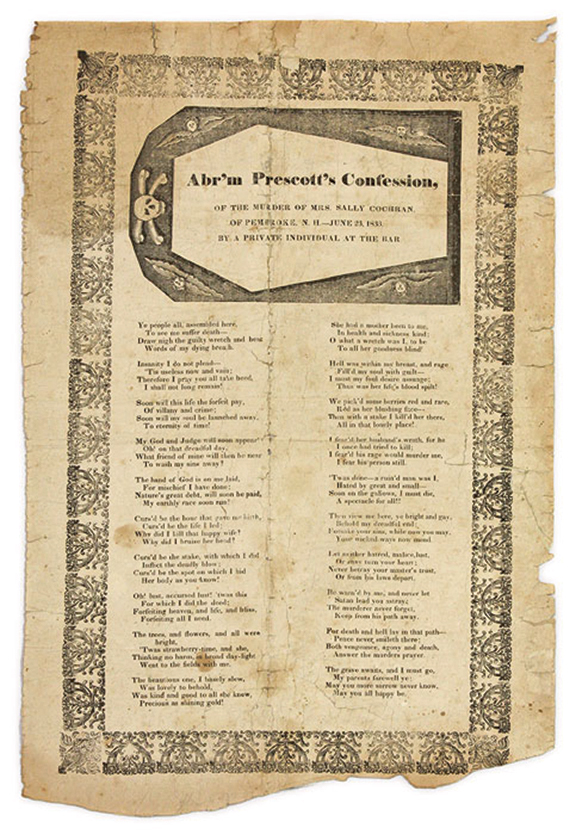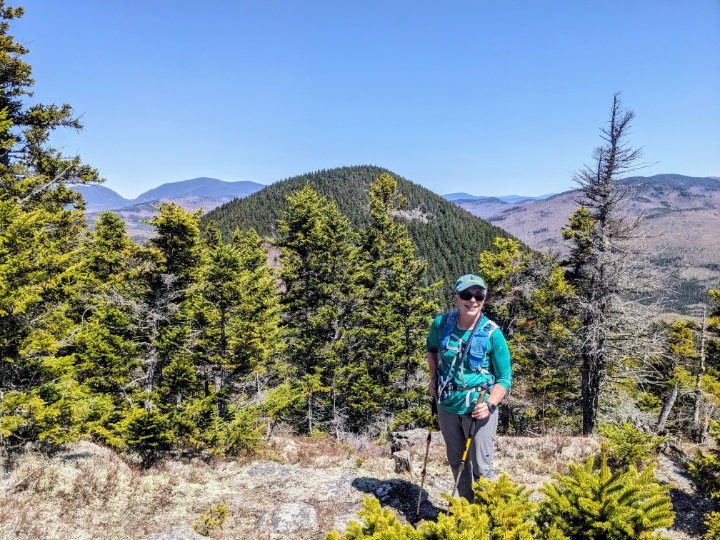The Strawberry Pasture Murder – A September Trial

PHOTO: Picture of woodcut print of Poem on Abraham Prescott’s Confession.


by Robert Hanaford Smith, Sr.
Weirs Times Contributing Writer
It was the first Tuesday of September in the year 1833 when Abraham Prescott was indicted in the Merrimack County Court at Concord for the murder of Mrs. Sally Cochran on June 23rd of the same year. Procedural delays, however, kept what was described as the first murder trial in Merrimack County, New Hampshire from taking place until a year later in September of 1834.
Abraham Prescott had lived with the Cochran family for three years and was only eighteen years old when he killed 28 year old Sally Cochran with a stake in the pasture belonging to her brother-in-law.
The big question that the judges and jury struggled to find an answer to was: “ Was Abraham Prescott aware of what he was doing when he took the life of his benefactor, Mrs. Cochran?” His defensive claim was that he did it while asleep.
Chauncey and Sally Cochran had taken 15 year old Abraham Prescott into their home and treated him as one of the family. He helped them by working on their farm in Pembroke. On the Sunday morning of June 23, 1833 Sally and Abraham went to a nearby pasture owned by Chauncey Cochran’s brother to pick strawberries.
Abraham had asked Chauncey if he was going to pick strawberries and received the answer of no because Chauncey was in the process of reading a book. Exactly what happened in the pasture is not entirely clear , but about an hour and a half later another member of the household, Chauncey’s mother, came to him and told him that she heard a strange noise. Upon going outside to investigate Chauncey found Abraham in the barn. The young man said that he had hit Sally with a stake (fence post) and killed her. Abraham was ordered to take Chauncey to his wife, which he reluctantly did, taking him to a part of the pasture where there were no strawberries and pointing to some bushes beside the brook field where he had put her body, having dragged it a some distance from where the killing took place.
Mrs. Cochran was still breathing when her husband found her, but died before medical assistance could be given. Prescott, while confessing to the murder, gave two different accounts of what had happened when he and Mrs. Cochran went to the pasture to pick strawberries. His initial story, told to Chauncey Cochran as they were running to the brook field where Sally lay dying in the bushes was that the act took place while he was sleeping. He said that he had a toothache and sat down near a stump and that was the last that he remembered until after Sally had been hit with the stake.
The second confession was made to John L. Fowler, the coroner, in the state prison. Mr. Fowler indicated at the trial that with some persuasion Abraham Prescott told him the following: “ …that he and Mrs. C went together across James C’s pasture and the brook field; that he wished to have his will of her– that she repulsed him and applied severe epithets. He than sat down by the stump; thought he should have to go to prison, which he would soon die as do. She was picking strawberries at a little distance. – he took the stake and struck her, she probably was not aware of his approach; made no ado.”

The trial was held in the North Meeting House in Concord because a large group of “spectators” was expected to attend. Prescott had entered a plea of not guilty and his lawyers, court assigned Ichabod Bartlett and Charles H. Peaslee, Esquires, based their defense on the argument that Prescott was sleepwalking when he struck Sally Cochran with a stake as well as being insane.
The prisoner, as he was referred to in the trial, was said to have had a habit of sleepwalking as a child and a previous incident in the Cochran household when he hit Chauncey and Sally with an axe while they were sleeping was attributed as a sleepwalking act. Prescott claimed that he didn’t know what he had done until he woke up and exhibited remorse for the attack which inflicted injury from glancing blows to their heads, but from which they recovered.
They accepted his explanation and no charges were filed against him.
Chauncey testified at the trial that the prisoner, during the three years he had lived with them, was kind and obedient, never refusing to perform labor, didn’t quarrel with the family, and always treated the children affectionately.
There were two or three children in the household along with Chauncey’s mother. Abraham was said to be bad-tempered and abusive towards the cattle and have some mental disability. The 12 man jury, which the prisoner was said to have chosen out of a potential 53 prospects, was given the task of trying to determine if young Prescott was unconscious (sleeping), insane, or completely aware of what he was doing when he killed Sally Cochran.
The Attorney General, George Sullivan, and the Solicitor, John Whipple, prosecuted the case for the State. Chief Justice William H. Richardson and several Associate Justices were present to oversee the trial.
Closing arguments were presented on Thursday and Peaslee spoke for ½ hour, after which Bartlett spoke “…giving an eloquent argument for four hours.” The attorney general spoke for two and a quarter hours for the prosecution’s final arguments in the afternoon.
On Friday of the trial week the jury came out with a verdict of “guilty” and Abraham Prescott was taken away to await sentencing. However, a motion was made the next day to set the verdict aside and grant a new trial.
It seems that before presenting their verdict that the jury had supper at the Eagle Hotel and in the morning some had gone to a barber shop to be shaved where other people were present and were talking about the prisoner and that he would probably be found guilty. The appeal was eventually granted and a second trial was held in September of 1835. Abraham Prescott was, for the second time, found guilty of murdering Sally Cochran.
Judge Nathaniel Upham sentenced Abraham Prescott to death for the murder with an execution date of December 23, 1835, but Governor William Badger granted a reprieve until January 6, 1836. Three years to the day from the axe attack on the Cochrans.
Prescott was executed by hanging in Hopkinton, New Hampshire. A large crowd of spectators braved a snow-storm to witness the event. The body of the young man who was labeled a homicidal somnabulist was buried in Rumney, New Hampshire.
The discussion that the murder case provoked is said to have been a factor that led to the establishment of a state mental hospital.



